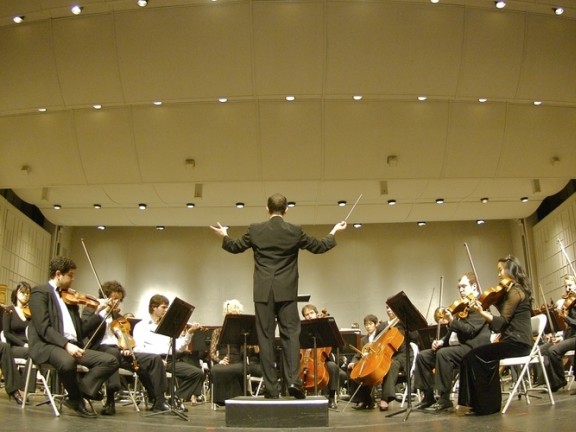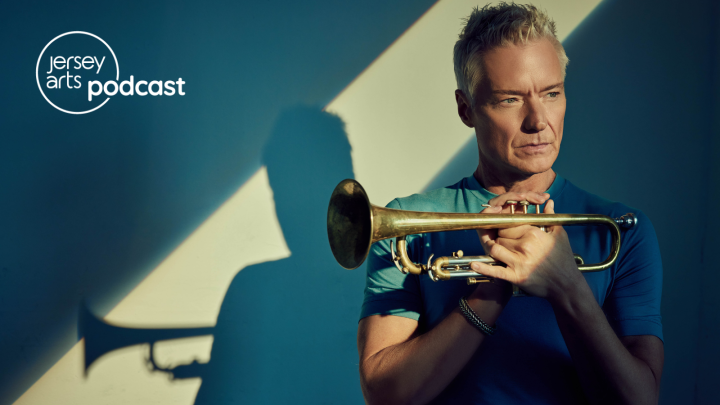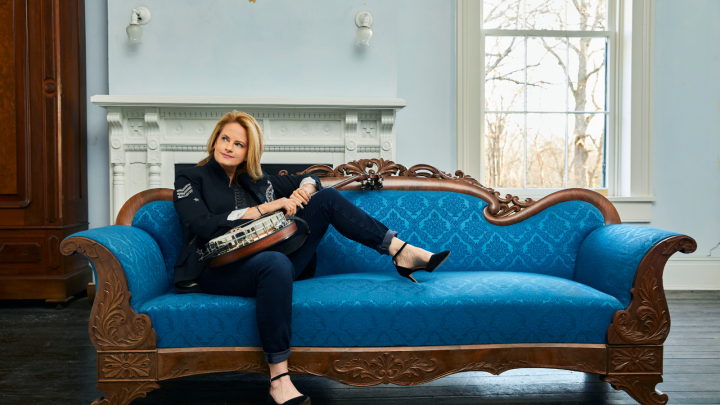An Evening of New and Classic Works with Symphony in C and violinist Maria Bachmann

Want to hear nearly 200 years of symphonic music in just one night? Camden-based Symphony in C is doing just that Friday and Saturday, March 1 and 2 in two venues: The College of New Jersey on March 1 and the Gordon Theater at Rutgers University-Camden --the Symphony’s usual venue-- on March 2. This marks the first time that Symphony in C has performed at TCNJ. The first work on the program is Felix Mendelssohn’s Overture to "A Midsummer Night’s Dream" (1826), followed by Paul Moravec’s Violin Concerto (2010/2013). The final work of the evening is Robert Schumann’s Second Symphony (1847).
When you hear the words “violin concerto,” perhaps composers such as Stravinsky, Mozart, Tchaikovsky or Bach come to mind. But new symphonic works are still being created today, which is really exciting for the music world.
Internationally renowned violinist Maria Bachmann will perform the Violin Concerto by Pulitzer Prize-winning composer Paul Moravec.
I recently spoke with Bachmann, to learn more about what it’s like to perform new works and her career:
Patricia Kiernan Johnson: You perform such a wide range of works, from Beethoven to premieres by contemporary composers. Does your process for preparing to perform these new works differ greatly from that of older repertoire?
Maria Bachmann: There are some differences, yes. First of all, when I know the composer, I can talk to him, ask him questions, give him some suggestions about certain things in the violin part. I can also work closely with them to see what he’s aiming for -- what he’s after. And I get feedback right away. So unlike composers of past centuries, I can just go to the source and have my questions answered. But it’s definitely more challenging in some ways to perform a work that is a brand new piece because there isn’t a standard template for the performance. I have to invent it in a certain way, musically -- from scratch -- and come up with something that I hope will be a convincing interpretation of the piece.
In the case of Paul Moravec, I’ve known him for over 20 years, we’ve been friends and I’ve played quite a number of his works. I’ve recorded them and premiered them, so I’ve very familiar with his style, his language and what’s he’s going for, emotionally. But this Concerto is a very challenging piece. When we premiered it three years ago in Philadelphia with Orchestra One—a group that specializes in performing contemporary music—it was a two-movement concerto. But now it’s a three-movement concerto. Moravec’s expanded it and changed it quite a bit; in a sense, it’s a new piece again.
PKJ: It sounds like you’ve had a very collaborative relationship with Moravec. Would you say that you typically get to offer feedback to composers?
MB: You know, it turns out that most composers are keyboard players, and they may be familiar with the technical aspects of playing a stringed instrument, but it’s not exactly the same as being a string player and knowing exactly what the capabilities are and what the possibilities are. So I try to be helpful and offer a few tweaks to make it a little stronger, while still achieving what the composer is looking for.

PKJ: What is it about performing new works that speaks to you as an artist?
MB: I find it really exciting to bring a composer, whose music I think really touches on an emotional level, to an audience, perhaps for the first time. Since they likely haven’t heard the piece before, in a way I have a very strong imprint on the piece itself and how it comes off. The experience can really show them how wonderful the world contemporary music can be. It’s a pleasure and a joy to bring that to an audience.
PKJ: In the opera world, where I work, the commissioning of new works (and second and third productions of those new works) is considered by many to be vital to the health of the art form. New works increase the diversity of the repertoire, generate interest in opera and can be a commentary on our world today. Do you find that to be similar in the symphonic world as well?
MB: It’s incredibly important to create new concerti and to record them. It’s absolutely critical that audiences perceive this as a living art form – it hasn’t died because the composers are no longer with us. It’s still alive and being created all the time! And while it’s wonderful to play the standards – I love playing Mendelssohn, Beethoven and Brahms and I treasure them – I also know that to keep music vital, we have to bring the best new violin concertos to the forefront. When new works are being created, there’s always something new and exciting to look forward to.
PKJ: You mentioned to me earlier that you haven’t performed with Symphony in C, or worked with their music director, Rossen Milanov, before. In situations like this, how do you go about building a rapport with the orchestra and conductor in the rehearsal period?
MB: It’s really key to make sure that they know that I’m listening to them, and to interact with them musically. The best collaborations are usually when an orchestra and a soloist are listening to each other and when the soloist gives and takes with the orchestra-- sometimes even taking their tempos instead. When that works well, the possibilities are limitless.
Bachmann and Symphony in C will record Moravec’s Violin Concerto next Sunday at the Gordon Theater for the Naxos label. This is the second professional recording for Symphony in C, which bills itself as one of only three professional training orchestras in the U.S., preparing musicians and conductors who are on the cusp of world-class careers through concert, educational outreach and professional development programs.
Symphony in C presents “Mendelssohn and Schumann” on Friday, March 1 at 8:00 p.m. at The College of New Jersey; for tickets, call 609-771-2775. The program will be repeated on Saturday, March 2 at 8:00 p.m. at the Gordon Theater at Rutgers University, Camden; for tickets, call 856-963-6683 or visit www.SymphonyinC.org.
For more information about the concerts, visit www.SymphonyinC.org. You can also check out the brief videos posted on The College of New Jersey’s Center for the Arts YouTube Channel:



